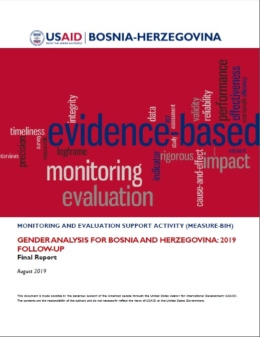MONITORING AND EVALUATION SUPPORT ACTIVITY (MEASURE)

MONITORING AND EVALUATION SUPPORT ACTIVITY (MEASURE)
GENDER ANALYSIS 2019 FOLLOW-UP
In 2019, the USAID Mission in BiH tasked MEASURE II with conducting the Gender Analysis 2019 Follow-up to inform the development of the upcoming 5-year USAID/BiH’s Country Development Cooperation Strategy (CDCS) and achieve better gender outcomes by following up on findings and recommendations highlighted in the 2016 Gender Analysis Report for BiH.
|
MEASURE II designed the mixed-methods approach, triangulating relevant information from the following sources: 1.Desk research/comprehensive literature review; More detailed methodology used by the MEASURE II team, as well as findings and recommendations are provided in the Gender Analysis 2019 Follow-up Final Report (see below). click on the image to download file |





